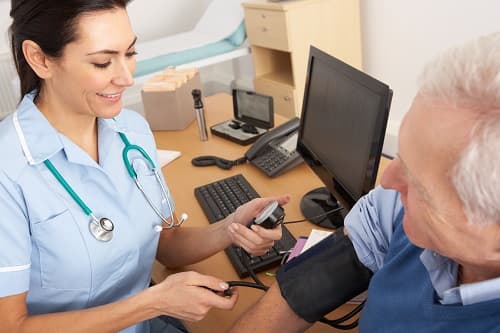A blood pressure test is the only way to find out if your blood pressure is too high or too low, because most people won’t have any obvious symptoms.
You can get an NHS blood pressure check at a number of places, including:
- your local GP surgery
- some local pharmacies
- at an NHS Health Check appointment offered to adults in England aged 40-74
Alternatively, you can measure your own blood pressure at home whilst referring to the information below.

NHS blood pressure check
Blood pressure is measured in millimetres of mercury (mmHg) and is given as 2 figures: systolic pressure – the pressure when your heart pushes blood out and diastolic pressure – the pressure when your heart rests between beats.
For example, if your blood pressure is “140 over 90” or 140/90mmHg, it means you have a systolic pressure of 140mmHg and a diastolic pressure of 90mmHg.
The guides below outline what your blood pressure readings could mean for your health. You can also see where your blood pressure numbers are on a graph which can be seen on the NHS blood pressure test page.
Your reading is high. If your GP practice does not already know about this, make an appointment to see either your doctor or nurse in the next three days to get it checked.
Known as the “silent killer”, high blood pressure rarely has obvious symptoms. But left untreated, it increases your risk of having a heart attack or stroke.
While you may need medication, the good news is you may well be able to lower your blood pressure through lifestyle changes, such as:
- losing weight (if you’re overweight)
- reducing the amount of salt in your diet
- exercising regularly
- cutting back on alcohol and caffeine
Support from One You Hounslow
One You Hounslow can support you to make lifestyle changes by helping you to be more active, eat more healthily, drink less and stop smoking. Complete the registration form below if you would like support towards a healthier lifestyle.
Your blood pressure is described as being high-normal. Ideally, it should be below 120/80mmHg. Known as the “silent killer”, high blood pressure rarely has obvious symptoms. But left untreated, it increases your risk of having a heart attack or stroke.
The good news is it can be brought under control through lifestyle changes, such as:
- losing weight (if you’re overweight)
- reducing the amount of salt in your diet
- exercising regularly
- cutting back on alcohol and caffeine
- you may also need medication
Check your blood pressure regularly and you should start to see a difference.
Support from One You Hounslow
One You Hounslow can support you to make lifestyle changes by helping you to be more active, eat more healthily, drink less and stop smoking. Complete the registration form below if you would like support towards a healthier lifestyle.
Your blood pressure is in the ideal range. Keep up a healthy lifestyle, as not only will this help your blood pressure – and risk of having a heart attack or stroke – but also many wider health issues. Pass the message on to friends and family – high blood pressure has no symptoms, so everyone should be tested regularly.
You can control your blood pressure by doing some or all of the following:
- maintaining a healthy weight
- taking regular exercise
- checking your blood pressure at least every five years
If you have a home blood pressure monitor, check your blood pressure regularly, but make sure to tell your GP you’re doing this.
Support from One You Hounslow
One You Hounslow can support you to make lifestyle changes by helping you to be more active, eat more healthily, drink less and stop smoking. Complete the registration form below if you would like support towards a healthier lifestyle.
Naturally low blood pressure is unlikely to cause any symptoms and is normally nothing to worry about.
However, if you have any of the following symptoms, please see your doctor:
- chest pain
- sweating
- shortness of breath
- unsteadiness
- dizziness
- lightheadedness
- fainting
Hypertension and Hypotension
High blood pressure (hypertension) can put a strain on your arteries and organs, which can increase your risk of developing serious problems such as heart attacks and strokes.
Low blood pressure (hypotension) isn’t usually as serious, although it can cause dizziness and fainting in some people.
If your pulse is irregular you should see your GP to check if you have atrial fibrillation. Atrial fibrillation is a heart condition that causes an irregular and often abnormally fast heart rate.
A normal heart rate should be regular and between 60 and 100 beats a minute when you’re resting.
